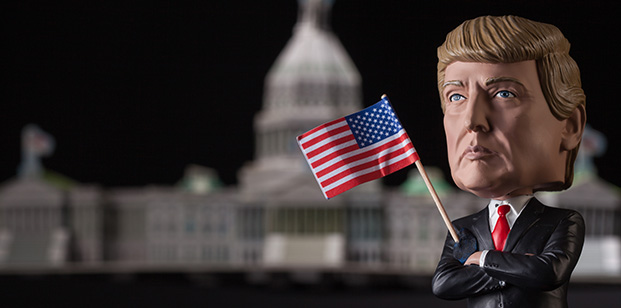Markets have shrugged off another round of tariff talk from the White House, but are they being too optimistic?
- Markets are assuming that Donald Trump will always ‘chicken out’ when faced with investor irritation
- Trump has reaped a $50bn dividend so far from his tariff regime
- Markets may be too complacent on both tariffs and inflation
It’s been a headline-making few weeks for global financial markets – the FTSE 100 hit 9,000, Nvidia achieved a $4bn market capitalisation, and the S&P 500 has hit new highs. You’d think we were in period of buoyant economic activity, happy relations between nations and easy global trade.
The reason given for all this joyful exuberance has been the now-famous ‘TACO’ trade. This is the assumption that Donald Trump will always ‘chicken out’ when bossed by the financial markets. However, that is starting to look like an increasingly irrational assumption.
Trump may have postponed the reciprocal tariffs until 1 August, but over the weekend he was busy on Truth Social threatening the EU and Mexico with 30% tariffs – which would be even higher than their current levels. He also threatened Brazil with 50% tariffs unless charges against right-wing ally Jair Bolsonaro were dropped - “[This] is a Witch Hunt that should end IMMEDIATELY!” he wrote.
Then there is the news, reported by the Financial Times, that Trump has reaped a $50bn dividend so far from his tariff regime, with major trading partners failing to retaliate. The economic impact is undoubtedly more nuanced: that $50bn may be being paid by US consumers, trading partners may still retaliate, or tariffs may be felt in weaker earnings for US corporates. However, Trump is not a man for nuance, and this is likely to embolden him.
Equally, tariffs are an instrument of control. They have proved a good way to get countries to do his bidding. He is unlikely to let go of this tool readily. With this in mind, the market’s apparent hope that tariffs will simply fade away appears misguided.
Tom Stevenson, investment director at Fidelity International, points out that markets may also be too complacent on inflation. “The market thinks the One Big Beautiful tax bill is a positive for growth, but it carries risks too. One of these is a pickup in inflation. There are signs of higher prices in commodity markets. Copper has soared on tariff fears. So too has coffee.” He points out that tariffs are likely to be inflationary as well. Will Americans tolerate a 50% rise in the price of their Brazilian coffee?
The upcoming earnings season will test the mettle of the market. Companies will undoubtedly have something to say about the impact tariffs are having on their businesses. This may prompt the market not to be quite so complacent about the conditions for the remainder of the year.









